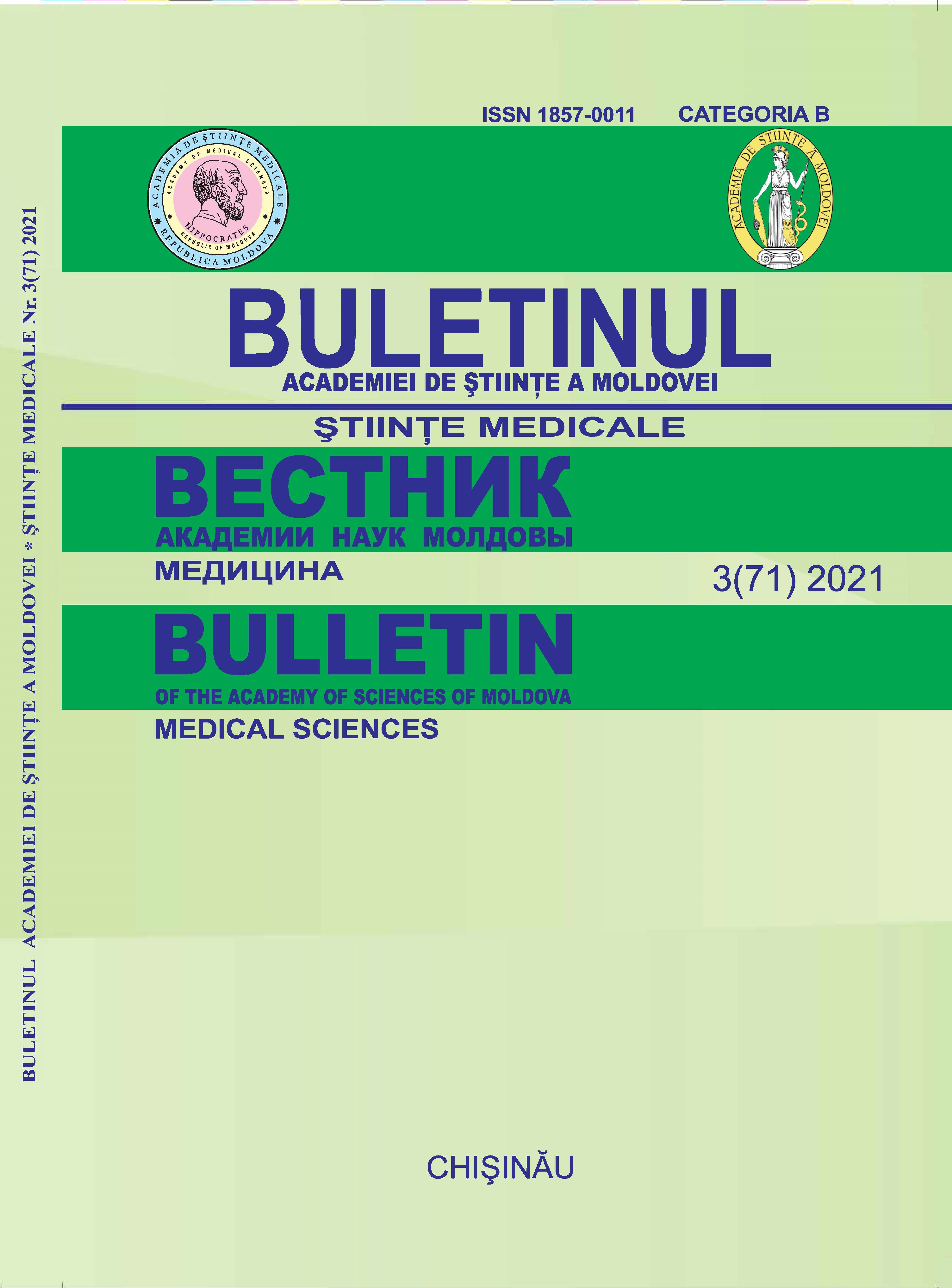New directions of research in the pharmacotherapy of Alzheimer’s disease
DOI:
https://doi.org/10.52692/1857-0011.2021.3-71.44Keywords:
Alzheimer’s disease, cognitive impairment, etiopathogenetic links, new drugsAbstract
Alzheimer’s disease, a neurodegenerative disease with a severe prognosis, accounts more than half of cases of dementia, associated with persistent and progressive memory loss, cognitive and personality disorders. According to the Alzheimer’s Association, in developed countries 13% of people over 65 years old suffer from Alzheimer’s disease, the fifth leading cause of death in patients of this age group. Data from the World Health Organization also shows that with the increase population and life expectancy, the overall incidence of Alzheimer’s disease will increase 4 times by 2050 and can reach 114 million. This will have a huge social impact and considerable economic burdens for the health system, as there are currently no efficient treatments for Alzheimer’s disease. The development of new, efficient and harmless drugs, designed to improve the quality and quantity of life of patients with Alzheimer’s disease remains a priority, and scientists globally combine their efforts to solve this problem. The etiopathogenetic links of Alzheimer’s disease are promising therapeutic targets for the discovery of efficient drug therapy
References
Baakman A.C., ‚t Hart E., Kay D.G. et al. First in human study with a prodrug of galantamine: Improved benefit-risk ratio?. Alzheimers Dement (NY). 2016;2(1):13-22. Published 2016 Jan 20. doi:10.1016/j.trci.2015.12.003
Boche D., Nicoll J.A.R. Invited Review – Understanding cause and effect in Alzheimer’s pathophysiology: Implications for clinical trials. Neuropathology and applied neurobiology. 2020;46:623-640.
Bomasang-Layno E., Bronsther R. Diagnosis and Treatment of Alzheimer’s Disease:: An Update. Dela J Public Health.2021 Sep 27;7(4):74-85. doi: 10.32481/djph.2021.09.009.
Congdon E.E., Sigurdsson E.M. Tau-targeting therapies for Alzheimer disease. Nat Rev Neurol. 2018 Jul;14(7):399-415. doi: 10.1038/s41582-018-0013-z.
Egan M.F., Kost J., Voss T. et al. Randomized Trial of Verubecestat for Prodromal Alzheimer’s Disease. N Engl J Med. 2019;380(15):1408-1420. doi:10.1056/NEJMoa1812840
Folch J., Busquets O., Ettcheto M. Et al. Memantine for the Treatment of Dementia: A Review on its Current and Future Applications. J Alzheimers Dis. 2018;62(3):1223-1240. doi:10.3233/JAD-170672.
Golde T.E., Koo E.H., Felsenstein K.M. et al. γ-Secretase inhibitors and modulators. Biochim Biophys Acta. 2013 Dec;1828(12):2898-907. doi: 10.1016/j.bbamem.2013.06.005. Epub 2013 Jun 17.
Graham W.V., Bonito-Oliva A., Sakmar T.P. Update on Alzheimer’s Disease Therapy and Prevention Strategies. Annu Rev Med. 2017 Jan 14;68:413-430. doi: 10.1146/annurev-med-042915-103753.
Hampel H., Vassar R., De Strooper B. et al. The β-Secretase BACE1 in Alzheimer’s Disease. Biol Psychiatry. 2021 Apr 15;89(8):745-756. doi: 10.1016/j.biopsych.2020.02.001. Epub 2020 Feb 13.
Hoskin J.L., Al-Hasan Y., Sabbagh M.N. Nicotinic Acetylcholine Receptor Agonists for the Treatment of Alzheimer’s Dementia: An Update. Nicotine Tob Res. 2019;21(3):370-376. doi:10.1093/ntr/nty116.
Hoskin J.L., Sabbagh M.N., Al-Hasan Y., Decourt B. Tau immunotherapies for Alzheimer’s disease. Expert opinion on investigational drugs. 2019;28:545-554.
Huang L.K., Chao S.P., Hu C.J. Clinical trials of new drugs for Alzheimer disease. J Biomed Sci. 2020;27(1):18. doi:10.1186/s12929-019-0609-7.
Lao K., Ji N., Zhang X. et al. Drug development for alzheimer’s disease: Review. Journal of Drug Targeting, 2019: 27(2), 164-173. doi_org/10.1080/1061186X.2018.1474361.
Loera-Valencia R., Cedazo-Minguez A., Kenigsberg P.A.et al. Current and emerging avenues for Alzheimer’s disease drug targets. J Intern Med. 2019 Oct; 286(4):398-437. doi:10.1111/joim.12959.
Ma K.G., Qian Y.H. Alpha 7 nicotinic acetylcholine receptor and its effects on Alzheimer’s disease. Neuropeptides. 2019 Feb;73:96-106. doi: 10.1016/j.npep.2018.12.003.
Mantile F., Prisco A. Vaccination against β-Amyloid as a Strategy for the Prevention of Alzheimer’s Disease. Biology. 2020; 9(12):425. doi.org/10.3390/biology9120425.
Marotta G., Basagni F., Rosini M., Minarini A. Memantine Derivatives as Multitarget Agents in Alzheimer’s Disease. Molecules (Basel, Switzerland). 2020;25:4005.
Panza F., Lozupone M., Logroscino G., Imbimbo B.P. A critical appraisal of amyloid-β-targeting therapies for Alzheimer disease. Nat Rev Neurol. 2019 Feb;15(2):73-88. doi: 10.1038/s41582-018-0116-6.
Parums D.V. Editorial: Targets for Disease-Modifying Therapies in Alzheimer’s Disease, Including Amyloid β and Tau Protein. Med Sci Monit. 2021;27:e934077. doi:10.12659/MSM.934077.
Pinheiro L., Faustino C. Therapeutic Strategies Targeting Amyloid-β in Alzheimer’s Disease. Curr Alzheimer Res. 2019;16(5):418-452. doi: 10.2174/1567205016666190321163438.
Pohanka M. Alpha7 nicotinic acetylcholine receptor is a target in pharmacology and toxicology. Int J Mol Sci. 2012;13(2):2219-2238. doi:10.3390/ijms13022219.
Sur C., Kost J., Scott D.et al. BACE inhibition causes rapid, regional, and non-progressive volume reduction i Alzheimer’s disease brain. Brain. 2020 Dec 1;143(12):3816-3826. doi: 10.1093/brain/awaa332.
Toniolo S., Sen A., Husain M. Modulation of Brain Hyperexcitability: Potential New Therapeutic Approaches in Alzheimer’s Disease. Int J Mol Sci. 2020 Dec 7;21(23):9318. doi:10.3390/ijms21239318.
Wolfe M.S. Probing Mechanisms and Therapeutic Potential of γ-Secretase in Alzheimer’s Disease. Molecules. 2021 Jan 13;26(2):388. doi: 10.3390/molecules26020388.
Wong K.H., Riaz M.K., Xie Y.et al. Review of Current Strategies for Delivering Alzheimer’s Disease Drugs across the Blood-Brain Barrier. Int J Mol Sci. 2019 Jan 17;20(2):381. doi:10.3390/ijms20020381.
Yiannopoulou K.G., Papageorgiou S.G. Current and Future Treatments in Alzheimer Disease: An Update. J Cent Nerv Syst Dis. 2020; 12: 1179573520907397.doi:10.1177/1179573520907397.
Zhu C., Fu S., Chen Y.et al. Advances in Drug Therapyfor Alzheimer’s Disease. CURR MED SCI 2020;40,999–1008.doi.org/10.1007/s11596-020-2281-2.
Downloads
Published
Issue
Section
License
Copyright (c) 2022 Bulletin of the Academy of Sciences of Moldova. Medical Sciences

This work is licensed under a Creative Commons Attribution 4.0 International License.



